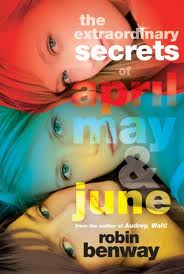The Extraordinary Secrets of April, May & June by Robin Benway
Reviewed by Chris

Ratings Explanation
Language: Contains about 20 swearwords or disrespectful terms, some repeatedly, and a fair amount of profanity. Includes bitch, asshole and the f-word. Used as part of general teen lingo, not pointedly toward adults, race, etc.
Sexual content: One character sees a vision that she is going to sleep with a certain boy in the future, and they refer to it several times later. One boy thinks about a girl “like she consisted of body parts and nothing else.” A boy is known to sleep around behind his girlfriend’s back. In one scene he is in the bedroom with a girl.
Adult themes: There is drinking of beer and vodka at a teenage party, and a girl gets sick. Two of the families have had recent divorces and the emotional trauma to the teenage kids is a main theme of the book. The kids’ acting out (drinking, hanging around with bad boys, skipping school) is shown as a reaction to the divorce situation and/or lack of attention from parents. A couple of teens were known to be high.
Synopsis
Except for their unusual names, three sisters named April, May and June seem like normal high schoolers who have just moved to a new town. But one day they suddenly start experiencing unusual abilities. April starts seeing visions of the future. May disappears and reappears. And June starts reading minds all around her. They are close sisters and good friends, but there is some difficulty making adjustments to their new abilities. They talk about using their skills only for good, but have some experiences being dishonest with each other, and they have to work it out. Most of their problems are “normal” problems—their parents have recently divorced, and they have moved to a new town. The oldest, April, worries constantly about protecting and guiding her sisters. May acts out by drinking and skipping school June thinks getting in with the popular girl will make her life. They like or don’t like certain boys and get to know them. They love their mother and are close to her. Their father has moved out of state and they miss him. They work together to avoid a disaster they expect in the future, and become closer through it.
If it had not been for the distraction of the bad language, I would have enjoyed this book thoroughly. The characters stand out individually, the girls start finding some positive ways to express themselves and learn good lessons about what really matters in life, there are tight bonds between the members of the family, and there are lines drawn between choosing good behavior and bad behavior rather than flat characters who are “good” or “bad.” Especially in certain parts of the book, the dialogue is a really fast-firing, witty-retort kind of dialogue like in some sit-coms. There are lots of pop culture references. It can be clever but is a bit overdone and sounds fake at times. But later the story evens out with more realistic conversation. Overall it had a positive message for high schoolers, but because of the language I would have a hard time recommending it.
It may be that teens hear this kind of thing at school everyday, but I feel that seeing it in print has the negative effect of legitimizing it.








